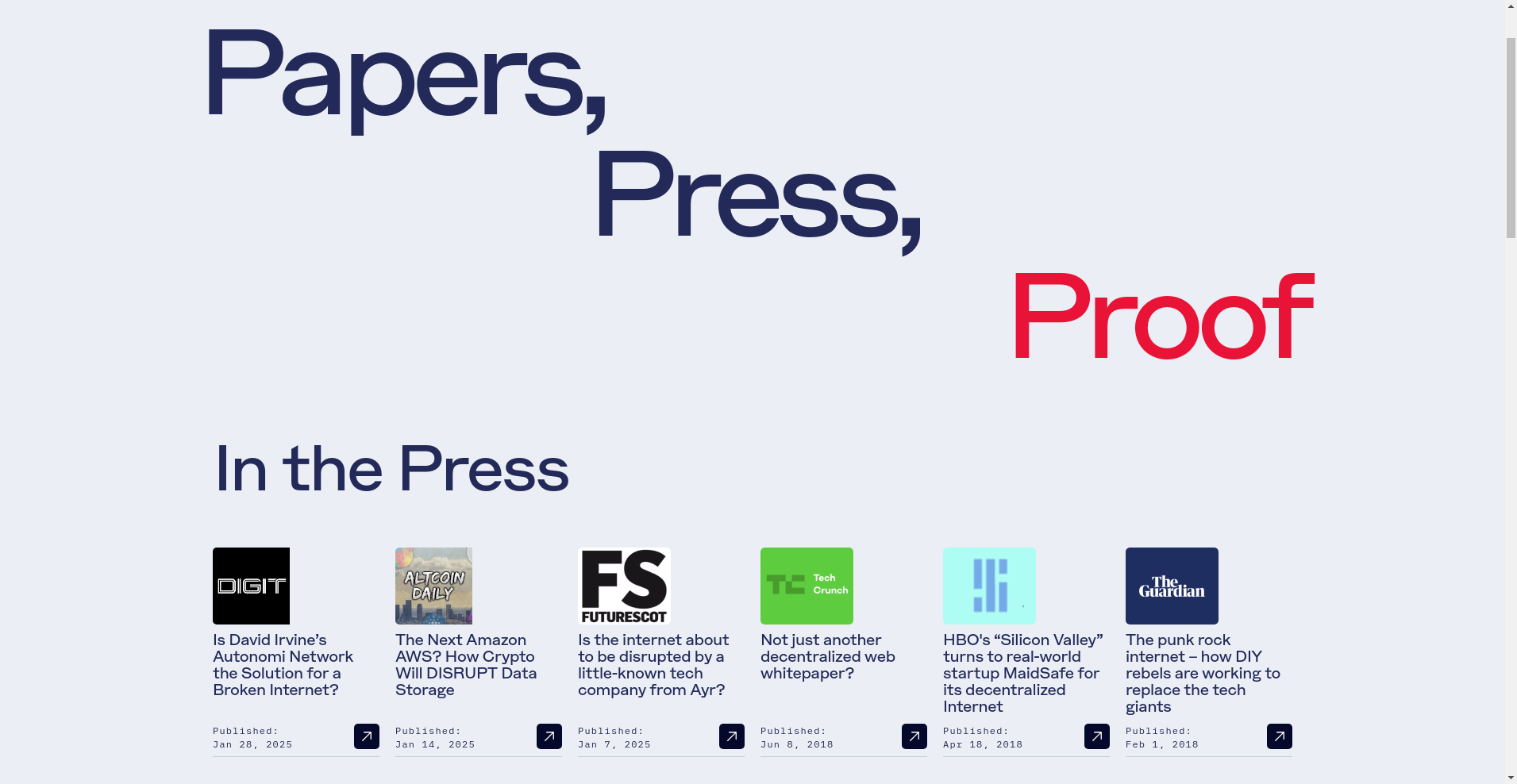Autonomi Review: Scam or Legit Crypto? Uncovering All The Red Flags

What Exactly Is Autonomi?
Autonomi proclaims itself as the world's first autonomous, decentralized data and communications network that operates on everyday devices. It promises a future where users can securely store, communicate, and manage data without centralized middlemen, powered by a novel, blockchain-independent technology. The project boasts features like quantum-safe encryption, lifetime storage for a one-time fee, and a network that grows in capacity as it expands.
However, as enticing as these claims sound, it is crucial to examine whether Autonomi is a groundbreaking innovation or merely another volatile project with potential red flags. This article provides an investigative review based on available data, audits, community activity, and underlying risks, to help you understand if investing or participating in Autonomi is safe.
Who Is The Team Behind Autonomi?
The credibility of a crypto project largely depends on the transparency and track record of its founders and team members. Official documentation indicates that Autonomi was initiated by a team with roots in MaidSafe, a project known for pioneering decentralized internet concepts. The key figures include:
- David Irvine: Established as the founder and chief R&D officer, Irvine has a long history with MaidSafe and holds over 40 patents. Despite his prominence, there is limited recent public information about his current activities or a verifiable presence on social media, which raises questions about transparency.
- Sarah Buxton and Jim Collinson: The team claims to possess expertise in decentralization, security, and technology, but their profiles lack detailed verifiable credentials or a clear history of involvement in similar projects outside Autonomi.
- Other members: The rest of the team’s background remains opaque, with little evidence of open-source contributions, prior project success, or transparent organization details.
Overall, while some founders have notable backgrounds, the lack of comprehensive public disclosures and independent audits of the team’s credentials cast doubt on the project's legitimacy and intentions. The roadmap's ambitious goals seem to hinge heavily on past reputation rather than transparent, proven execution.
Autonomi Security Audit: A Deep Dive into the Code
Based on Cyberscope’s audit data, Autonomi has undergone at least one security review, which indicates an audit was performed without critical vulnerabilities reported. Here are key points from the audit:
- Audit Status: It has an official audit with assessments documented, though detailed vulnerabilities, if any, are not publicly disclosed.
- Security Score: The network’s security score is approximately 94.4%, which is high but not infallible. High scores do not necessarily mean complete safety—only that no critical flaws were found during that particular review.
- Code Transparency: The audit covers specific contracts like Claims, Emissions, and NFT management. However, much of the critical infrastructure’s source code remains unreleased or unverified by third parties, raising concerns about hidden backdoors or vulnerabilities.
- Centralization Risks: The audit does not specify the degree of node decentralization, nor does it address potential validator or operator centralization—an issue common in similar projects.
While a security audit is a positive step, it hardly confirms the project’s trustworthiness. Without open-source code, independent third-party reviews, and transparent governance, the safety of Autonomi remains uncertain, especially given the complex security challenges inherent in decentralized systems.
Autonomi Tokenomics: A Fair System or a Trap?
The $ANT token is described as the fuel for the network, facilitating participation, rewards, and governance. The project indicates tokenomics details are available, but comprehensive data appears limited. Key takeaway points include:
- Total Supply: Not explicitly specified but implied to be substantial, with ongoing mining and node rewards likely leading to inflationary risks.
- Distribution: Initial distribution mechanisms, vesting schedules, or allocation to founders and early investors are not clearly documented, raising concerns about possible centralization of tokens.
- Utility: Used to pay for storage, incentivize nodes, and participate in governance, which aligns token demand with network activity.
- Risks: Without transparent distribution and burn policies, there's a high risk that early insiders or the team could dump tokens, causing price volatility and harming investor trust.
In sum, the opaque tokenomics structure and lack of detailed economic safeguards suggest potential for market manipulation or destabilization, especially if the project’s actual user adoption falls short of hype.
Is Autonomi a Ghost Town? Checking for Real Activity
The available data suggests moderate community engagement, with approximately 3,367 members in Discord and active social channels. However, active development or real-world ecosystem growth appears limited. There are no reports of significant collaborations, enterprise adoption, or continuous code commits from reputable developers.
The project relies heavily on press releases, self-published white papers, and promotional videos rather than demonstrable usage metrics or third-party validation. Without broader adoption, proven infrastructure, or real-world implemented applications, Autonomi risks being vaporware—an unfulfilled promise that never turns into tangible user adoption.
Investors should approach such projects with skepticism, especially when progress is predominantly marketing-driven, and the community activity is stagnating or driven by a small core group without external validation.
What Autonomi's Legal Documents Are Hiding
- Ambiguous Terms: The legal documentation, including Privacy Policy and Terms of Service, are minimal and offer limited transparency about governance, dispute resolution, or liability.
- Ownership & Control: The ownership of the network infrastructure, code, and treasury remains unclear, increasing risk of centralized control or malicious takeover.
- User Data & Privacy: Because the project emphasizes privacy, detailed policies should clarify data handling, but existing documents provide vague assurances without technical or audited evidence.
- Potential Hidden Clauses: Lack of detailed legal disclosures raises suspicion about hidden predatory clauses, such as irreversible token lock-ins or vague liabilities.
These legal ambiguities heighten risks, especially if the project’s claims of decentralization and privacy are superficial or exaggerated.
Final Verdict: Should You Risk Investing in Autonomi?
Based on the available data, Autonomi presents an ambitious vision for a decentralized, user-owned internet infrastructure. While some security points are promising, serious red flags remain regarding team transparency, unverified code, opaque economic models, and questionable real-world activity.
Investors should proceed with extreme caution. The project’s promises of security, privacy, and scalability are not sufficiently substantiated by independent audits or broad community validation. Its potential for exit scams, token dumps, or project stagnation cannot be ignored.
Positive Points:
- Security audit available, with high recent security scores
- Ambitious technological goal of blockchainless, scalable data network
- Community channels exist for engagement
Major Red Flags:
- Opaque team backgrounds and limited transparency
- Vague or undisclosed tokenomics and distribution details
- Limited actual development activity or third-party validation
- Legal documents are minimal and potentially misleading
- Risk of project stagnation or exit scams
In conclusion, due diligence and skepticism are advised. Do not invest unless there are substantial signs of genuine progress and transparency.

Daniel Clark
On-Chain Quantitative Analyst
I build algorithmic tools to scan blockchains for signals of manipulation, like whale movements and liquidity drains. I find the patterns in the noise before they hit the charts.
Similar Projects
-
Crybaby ($CRYBB)
Crypto Scam Checker Review: Is Crybaby ($CRYBB) a Legit Project or a Scam? | Crypto Project Scam Checker
-
FECES
FECES Crypto Review: Is This Meme Coin a Scam? Crypto Project Scam Checker & Honest Review
-
Trump Memes ($TRUMP)
In-Depth Review of Trump Memes ($TRUMP): Is This Crypto Project a Scam or Legitimate? | Crypto Scam Checker
-
Anyswap
Anyswap ($ANY) Review: Investigating Its Disappearance & Risks
-
KnightSwap
KnightSwap Review: Scam or Legit Crypto? Scam Check & Analysis